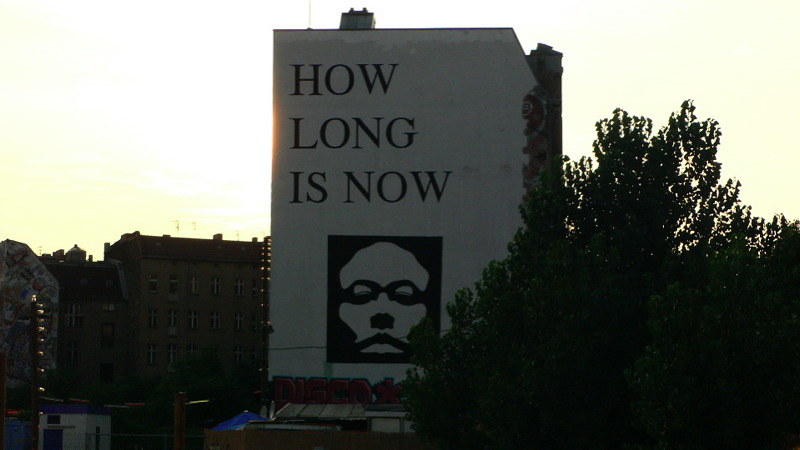Archive for June, 2021
Why not now?
 If you are anxious, you’re worried about what might happen. You’re living in the future. If you are sad or angry, you’re reacting to what happened. You’re living in the past. Nothing can be accomplished when living in the past because the die is cast. And nothing can be accomplished when living in the future because it’s all in your head. The only time we have is now.
If you are anxious, you’re worried about what might happen. You’re living in the future. If you are sad or angry, you’re reacting to what happened. You’re living in the past. Nothing can be accomplished when living in the past because the die is cast. And nothing can be accomplished when living in the future because it’s all in your head. The only time we have is now.
The only time to start is now. Even if your project is a short one, you’re in a day-for-day slip with your completion date for every day you don’t start. And this is doubly true for long projects. If you’re living in the past, you block yourself from starting because the last project was difficult, you didn’t have the resources or it didn’t come out as expected, and you want to protect yourself from a rerun. If you’re living in the past, you block yourself from starting because you don’t know how it will turn out, you don’t have all the answers, you don’t have sufficient resources, and you don’t know what you don’t know. Acknowledge the problems with the past and potential problems with the future, and start anyway.
Starting starts with starting.
The only time to say something is now. If you’re living in the past, you block yourself from saying something controversial or thought-provoking because you remember how it went the last time someone did that. If you’re living in the future, you prevent yourself from saying something radical because, well, you weren’t paying attention and missed your opportunity to change history. Acknowledge that there may be some blowback for your insightful comments, live in the now and say them anyway. And live in the now so you can pay attention and use your sharp wit to create the future.
If you don’t say something, nothing is ever said.
The only time to help is now. Living in the past, you block yourself from understanding the significance of the situation because you see it through old lenses. Living in the future, you block yourself from helping because you worry if the helping will help or worry the helping will get in the way of your future commitments. If someone needs help, help them now. They will understand that the outcome is uncertain, and they’re okay with that. In fact, they will be happy you recognized their troubling situation and made time to check in with them. When you live in the now, people appreciate it. The time to help is now.
When no one helps, no one is helped.
When you find yourself living in the past, close your eyes, recognize your anger or sadness, and focus on your breath for ten seconds. And if that doesn’t work, put your hand on your chest and do it again. And if that doesn’t work, tell yourself your sadness is temporary and do it again. This is a fail-safe way to bring yourself into the now. Then, sitting in the now, start that project, say what must be said, and help people.
And when you find yourself living in the future, close your eyes, recognize your anxiety, and focus on your breath for ten seconds. And if that doesn’t work, put your hand on your chest and do it again. And if that doesn’t work, tell yourself your anxiety is temporary and repeat. This will bring you into the now. Then, sitting in the now, start that project, say what must be said, and help people.
The only time to shape the future is now.
“HOW LONG IS NOW” by dr. motte is licensed under CC BY 2.0
Can you spot a good leader?
 When the team can get things done without the leader, that’s the sign of a good leader.
When the team can get things done without the leader, that’s the sign of a good leader.
If the organization bypasses the leader and goes directly to the subject matter experts, that’s because the leader trusts the subject matter experts.
When subject matter experts are trusted, they do amazing work. Good leaders know that.
When a team leader tells you they made a mistake and take full responsibility for it, they make it safe for you to do the same.
When the team can write a good monthly report while the team leader is on vacation, that’s good for the company and the people who can write a good report on their own.
Good leaders know that they make mistakes and know you will too. And, they’re okay with all that.
When a leader won’t tell you what to do, it’s because she believes in you and knows you’re the best person to figure it out.
When a leader says “I don’t know.” they make it safe for team members to do the same.
When a team leader defers to you, that leader knows the limits of their knowledge and yours.
When a leader responds to your question with a question, the leader is helping you answer your question so you can answer it next time on your own.
Good leaders know that sometimes good people don’t know the answer. And they’re okay with that.
When a leader is comfortable with you reaching out to their boss without their knowledge it’s because that leader has told you the truth over the last several years.
Good leaders don’t celebrate failure, they celebrate learning.
When a leader asks you to use your best judgment, that’s a compliment.
When leaders show their emotions in front of you, it demonstrates that they trust you.
Judge a leader by the performance of people on their team.
“020 Row of Bhikkhunis” by Anandajoti is licensed under CC BY 2.0
When you don’t know the answer, what do you say?
 When you are asked a question and you don’t know the answer, what do you say? What does that say about you?
When you are asked a question and you don’t know the answer, what do you say? What does that say about you?
What happens to people in your organization who say “I don’t know.”? Are they lauded or laughed at? Are they promoted, overlooked, or demoted? How many people do you know that have said: “I don’t know.”? And what does that say about your company?
When you know someone doesn’t know, what do you do? Do you ask them a pointed question in public to make everyone aware that the person doesn’t know? Do you ask oblique questions to raise doubt about the person’s knowing? Do you ask them a question in private to help them know they don’t know? Do you engage in an informal discussion where you plant the seeds of knowing? And how do you feel about your actions?
When you say “I don’t know.” you make it safe for others to say it. So, do you say it? And how do you feel about that?
When you don’t know and you say otherwise, decision quality suffers and so does the company. Yet, some companies make it difficult for people to say “I don’t know.” Why is that? Do you know?
I think it’s unreasonable to expect people to know the answer to know the answers to all questions at all times. And when you say “I don’t know.” it doesn’t mean you’ll never know; it means you don’t know at this moment. And, yet, it’s difficult to say it. Why is that? Do you know?
Just because someone asks a question doesn’t mean the answer must be known right now. It’s often premature to know the answer, and progress is not hindered by the not knowing. Why not make progress and figure out the answer when it’s time for the answer to be known? And sometimes the answer is unknowable at the moment. And that says nothing about the person that doesn’t know the answer and everything about the moment.
It’s okay if you don’t know the answer. What’s not okay is saying you know when you don’t. And it’s not okay if your company makes it difficult for you to say you don’t know. Not only does that create a demoralized workforce, but it’s also bad for business.
Why do companies make it so difficult to say “I don’t know.”? You guessed it – I don’t know.
“Question Mark Cookies 1” by Scott McLeod is licensed under CC BY 2.0
Trust-Based Disagreement
When there’s disagreement between words and behavior, believe the behavior. This is especially true when the words deny the behavior.
When there’s disagreement between the data and the decision, the data is innocent.
When there’s agreement that there’s insufficient data but a decision must be made, there should be no disagreement that the decision is judgment-based.
When there’s disagreement on the fact that there’s no data to support the decision, that’s a problem.
When there’s disagreement on the path forward, it’s helpful to have agreement on the process to decide.
When there’s disagreement among professionals, there is no place for argument.
When there’s disagreement, there is respect for the individual and a healthy disrespect for the ideas.
When there’s disagreement, the decisions are better.
When there’s disagreement, there’s independent thinking.
When there’s disagreement, there is learning.
When there’s disagreement, there is vulnerability.
When there’s disagreement, there is courage.
When there’s disagreement, there is trust.
“Teamwork” by davis.steve32 is licensed under CC BY 2.0

 Mike Shipulski
Mike Shipulski